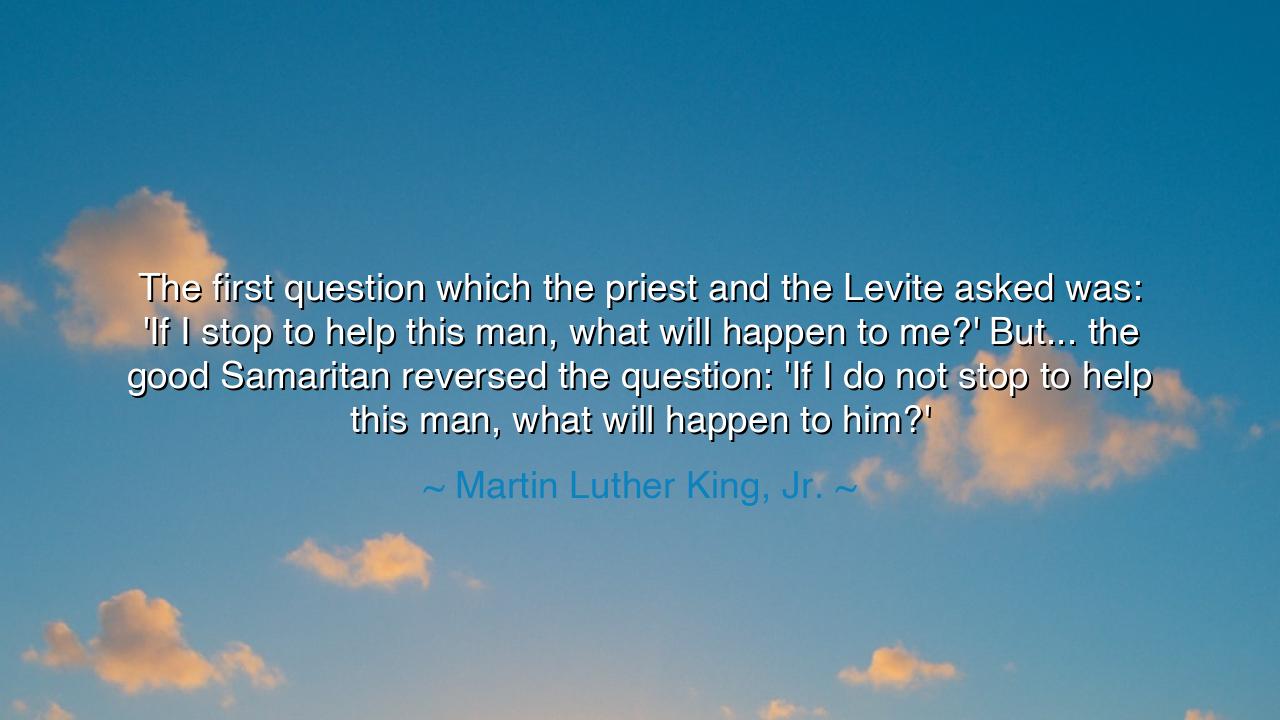
The first question which the priest and the Levite asked was: 'If
The first question which the priest and the Levite asked was: 'If I stop to help this man, what will happen to me?' But... the good Samaritan reversed the question: 'If I do not stop to help this man, what will happen to him?'






Hearken, O seeker of wisdom, to the words spoken by the prophet of our age, Martin Luther King, Jr. In his meditation upon the parable of the Good Samaritan, he revealed a truth both ancient and enduring: “The first question which the priest and the Levite asked was, If I stop to help this man, what will happen to me? But the good Samaritan reversed the question: If I do not stop to help this man, what will happen to him?” Here lies a mighty reversal, a turning of the soul outward, away from the chains of self-preservation toward the light of compassion. For the path of righteousness is not carved by fear of harm, but by the courage to shoulder another’s burden.
In the days of old, when Israel’s roads ran red with the dust of many pilgrims, there lay a wounded man, abandoned and bleeding by the wayside. The priest, servant of the temple, passed by; the Levite, custodian of sacred law, passed by. Both were bound by ritual, by the question of what may befall me if I risk my safety, my purity, my standing? Yet the Samaritan, despised by the Jews as an outcast, felt the piercing flame of mercy. He did not ask about himself; he asked about the stranger. And thus the one cast aside by society became the model of neighborly love.
King, in echoing this sacred tale, spoke not only of antiquity but of his own battlefields: the streets of Montgomery, Birmingham, Selma, where hatred festered and fear whispered to the hearts of men, “Protect yourself. Preserve your comfort.” Yet the spirit of the Samaritan thundered against such whispers. He called upon men and women to look not inward in trembling, but outward in courage: What will become of my brother if I do not rise? What will be the fate of my sister if I stand still?
Consider the tale of Harriet Tubman, daughter of bondage, who could have fled to freedom and never returned. She might have asked, If I return to the South, what will happen to me?—and surely the gallows or the whip would have answered. But she reversed the question, If I do not return, what will happen to them? And so she became Moses to her people, leading them through the night toward the Promised Land. Her life bore witness to the very truth King preached: that selfless love is mightier than fear, and sacrifice more enduring than selfish preservation.
This teaching does not dwell only in the grand struggles of nations, but also in the quiet choices of daily life. A neighbor lies in despair, a child trembles in hunger, an elder suffers in silence. The selfish heart asks, If I extend my hand, what inconvenience will I suffer? But the awakened heart, the heart aflame with the spirit of the Samaritan, asks instead, If I do not extend my hand, what doom will descend upon them? This is the difference between the coldness of apathy and the warmth of humanity.
Let us not be deceived: such reversal demands courage. It is easier to pass by on the other side, to close one’s eyes, to harden one’s spirit. Yet the road of the Samaritan, though perilous, is the road of eternal honor. For it is written upon the heart of mankind that love alone endures beyond the grave, and the measure of a soul is not in what it has shielded from harm, but in what it has given for the sake of another.
Therefore, O listener, take this lesson as a lamp for your path: when faced with the suffering of another, silence the question of self-interest. Do not ask, “What loss will I endure?” but ask, “What loss will they endure if I do not act?” In this lies the key to building communities of justice, households of peace, and a world where compassion reigns.
Practical is this teaching, though it springs from heavenly heights. Begin with small deeds: give water to the thirsty, speak kindly to the forgotten, defend the oppressed though it costs you comfort. Let each day bear at least one act born not of fear but of love. For thus shall you walk in the footsteps of the Good Samaritan, thus shall you echo the call of King, and thus shall your life itself become a parable worthy to be remembered.






AAdministratorAdministrator
Welcome, honored guests. Please leave a comment, we will respond soon